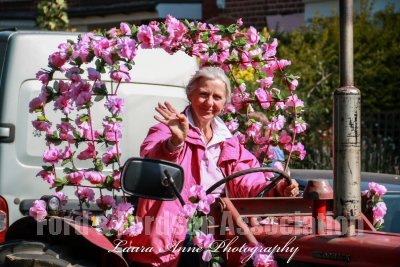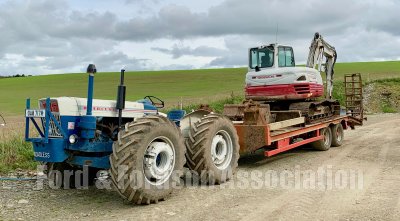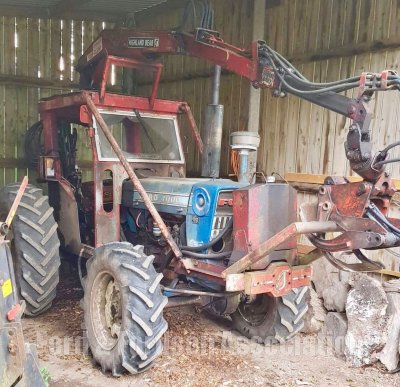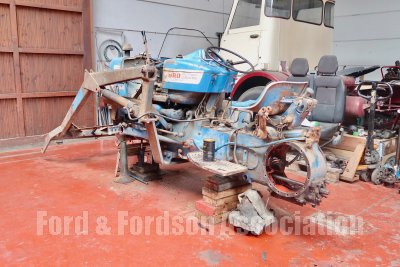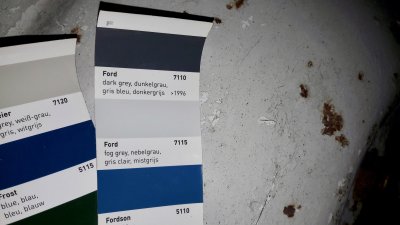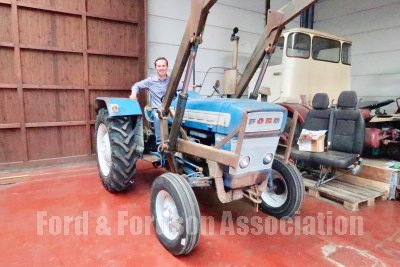2021 March
From the Chair: for Issue 101 (Feb/Mar 2021)
The true financial cost of this pandemic is as yet unknown but in terms of the personal human tragedies to health, jobs and mental wellbeing it will be colossal and is mounting daily. The day of reckoning will come, the tallies counted, which will swiftly be followed by arguments over missed opportunities and others apportioning blame and then, as usual, our politicians will squabble all trying to pass the buck and blame one another. Make no mistake, in the end, we shall all pay for it one way or another, probably for years to come.
But enough negativity. writing this in late November the 'Festive Season' is still to come, and the good news is that we will now be allowed to meet other family members to celebrate even if on a rather restricted basis. On behalf of the committee, we hope you had a very enjoyable Christmas and wish you a happy New Year.
It really does seem that a choice of viable vaccines may soon be available so hopefully things can begin to return to some sort of normality in the foreseeable future. Please do stay safe till then, particularly now as it appears that the end of this terrible time is finally soon to end. I am looking forward to the first show!
Although this is officially the February March issue it will drop through your letter box in January. In normal times we would be at the start of the season with Nick Bryne and his team kicking it off with the Somerset Vintage and Classic Tractor Show at Shepton Mallett followed by Tractor World at Malvern, one of my favourites and where we usually hold the Club's Annual General Meeting (AGM). Unfortunately, the decision to cancel this year's event has already been made and so an announcement regarding our AGM will follow; in the interim please see a report from our Treasurer.
FFA AGM - Jane Broomhall reports:
For the last six years we have held our AGM at Malvern and provided the opportunity for members to hear reports from our Chairman in respect of the year's activities and from myself in respect of the club's financial situation. We also like to receive your questions and to hear about any ideas you have for future events.

We are required to hold an AGM each year and will plan and advertise this as soon as the show calendar starts to re-emerge.
In the meantime, I can confirm that your Club is in a very satisfactory financial position and has seen an influx of new members during the last twelve months. Merchandise sales have obviously been affected by the lack of events, so our stock will be higher than expected at year end, but there was a steady flow of orders in the lead up to Christmas.
The AGM is also a time for confirmation of committee members for the following twelve-month period and I am pleased to say that those members standing for re-election have each confirmed their willingness to continue; albeit this will need to be ratified. A full listing of current committee members is shown below, all contact details can be found on our website.
Chairman:Patrick Pawsey
Secretary/Treasurer: Jane Broomhall
Committee Members:
Margaret and Derek Badham,
Ken Bailey,
Keith Broomhall,
Luke Burgess,
Graeme Clark,
Roy Cowgill,
Rodney Gibson,
Ian and Lin Prince,
Peter Mitchem
The Ford & Fordson Facebook:
personally, I spend little time on Facebook but many of you love it and the Club has over six thousand followers. Some have had problems joining the community, but it is really simple. If you already belong to the Facebook community go into your 'search bar' and type in Ford & Fordson, and you will find a choice of two sites - click the one with our Logo the other is the American Club's site. When it comes up 'like' it is as simple as that. You can make a post but, as with all properly run sites, they have to be approved by the moderator before they appear for others to see. This is simply to prevent unsuitable or offensive material appearing that as you all know is the bane of the WWW.
Ford & Fordson Tractor Collection Issue 1:
A New Bookazine from Kelsey Publishing.
This is a new series with four issues per annum each of which will deal with a single model, range of models or derivatives such as the 1000 series or County. 'Issue 1' is the Fordson Dexta and the editor is Chris Graham. Personally, I prefer the printed version as I find online publications difficult to cope with, but many prefer them. There are close to 100 pages packed with excellent photographs and well written guides that include the reason this model was built and how that came about. For example, it is derived from the American Fordson N 9 (as was the grey Fergie) and why the Perkins engine was used (an early example of 'just in time' component supply). It features a comprehensive 'buying guide' that lists items to check before purchase and is a useful aid memoire even to those who already know the tractor. There are several owners 'experience' pieces that give a good flavour of the joys of ownership. Peter Love shares personal experience comparing the diesel engine against the petrol version.
My experience of Dextas began when father bought a Super Dexta in 1962 followed by a second in late 1963 shortly before he retired, I still have it, both replaced Fergusons. While reading Issue 1, there were a few statements that didn't sit easily with me, for example Graham Morris mentions: … "almost-mythical petrol-engined example.' and goes on to say that no petrol powered Dextas seem to have been offered as production tractors, but there are very few. Petrol tractors were never intended for the UK market and are rare in this country, but some have found their way back. I thought the service and maintenance sections useful, but it is a pity that the fact corrosion inhibitors wear out in anti-freeze just as in engine was not mentioned. However, these are small criticisms, and I was glad that Andrew Hall mentioned the height of the clutch pedal when that is in use. As a young man I don't recall it troubling me unduly but do find it uncomfortable to use now.
Overall, I think this is a very good publication, a must read for anyone thinking of buying their first Dexta and interesting to current and past owners. I recommend that you find room for it on your bookshelf - it costs £8-99 on the newsstand or £28.77 by DD for a year's subscription of four issues, each on a different Ford model - it will certainly be on mine!
From our Members:
Martin Carley brings the tale of a French Dexta:
Miguel Davis lives in a small village 10 km from Mont Saint Michel in Normandy, France. Although not a farmer's son, growing up in very rural surroundings it was quite natural that tractors and agricultural machinery would play a big part in his life.
On leaving school he studied industrial maintenance then worked in a maintenance department, till moving to an administrative post. After a while the need to get back to what he liked best, drew him to look for a tractor. After helping friends on their projects, he started looking for one of his own. He found a McCormick F270 that looked good in the photo, but in reality, was a wreck! It took four years to sort out and for a while he was able to use it for haymaking etc...
This summer he had an offer on the McCormick and whilst delivering it spotted a Fordson Dexta. The owner assured him it was scrap as the bores were badly worn and the injector pump no longer worked and as the tractor would not start, he just wanted to dump it.

I will report as the project progresses, but now I have to leave this to Miguel to say in his own words: -
After an exchange of a few Euros the tractor was mine. My friend who helped me deliver the McCormick and I, used that to load the Dexta onto our trailer and I returned home to start a new venture. In August I attempted to start it with a battery. Nothing happened. So, with the help of another tractor we pulled her and after a few hundred yards she started! I then drove her from my friend's farm to my house and she drove very well. Now my Fordson Dexta is installed in my garage ready for the restoration.
I shall split the project in 3 phases:
1. 2020 Electricity, Loom etc., change oils, sort the cooling system.
2. 2021 Use for the hay season in 2021 to sort out problems
3. 2022 Painting and aesthetics
The Swinging Sixties - Part One!
In issue 99 Andrew Green wrote about the Fordson Major tractor and the huge influence it had on the tractor market, both here and abroad. The time had arrived for its replacement and these were going to be big shoes to fill. To effect this change, the Fordson name was dropped having been used ever since 1917 on all their tractors produced. Ford tractors as they would now be known had developed a brand-new range of 4 tractors which were going to be marketed all over the world and would be known as the 6X range and the 1000 series. They had specifically built a new factory on a hundred acres at Basildon in Essex. Production would also be carried on at Antwerp in Belgium and Highland Park in the U.S. In their advertising, these were dubbed "4 All new tractors from Fords, ahead of the world".
These were indeed exciting times. This was the era of the Swinging Sixties as they became known! The Beatles, Mary Quant and the miniskirt, Twiggy, mods & rockers, pirate radio and the Avengers. This fun was all mainly London based, not too much excitement for us boys out in the sticks! For me 1966 was a good year as England won the football World Cup but more importantly Fords were winning Le Mans for the first time which had a profound influence on me personally as it affected my bias to all things Fords from then on which is still with me today! Incidentally, if you get the chance to watch a recent film called "Le Mans 66", it is an entertaining tale of the battle of Fords v Ferrari, not just for us petrol heads but it also has a good storyline. It first came out last Autumn.
Enough of this, back to the new 1000 series. As I said previously, there were 4 models in the beginning starting with the smallest, the 2000 a three cylinder, 37bhp also known as the Dexta, next came the 3000, called the Super Dexta. The 2 bigger tractors were the 4000, 55hbp, the Major and lastly came the biggest, the 5000, four-cylinder 65bhp the Super Major. These old names were kept as a marketing exercise to help farmers identify the new range and relate to the old Fordsons that they had been used to. With the new models came some outstanding new modern styling with great looking nose cones and distinctive bonnets with white bands and louvres which a tractor salesman friend of mine nicknamed "Spitfire" bonnets. I just loved the look of these tractors as you can probably tell! The exception to this livery was the little 2000 tractor that had no white and was painted all blue, something I never could quite understand. One of the optional extras on these models was Select O Speed which is like a semi-automatic powershift transmission. This proved to be a little like marmite, love it or hate it! Yes, there were problems, but I think many of these could have been attributed to operator misuse. One of my neighbours said that SOS was simply the best! Prices went from £680 for the 2000 up to £960 for the 5000.
There were some initial teething problems which were resolved and the 6Y range became a worldwide success story. On our family farm we had three 4000's to do the heavy work as they were worked with Ransomes TS83 3 furrow reversible ploughs.

This was a new concept for us, but it soon was appreciated by everyone having level fields. Two big advantages of the 4 and 5000's for us were independent PTO operation and disc brakes, a huge advantage for drivers over other manufacturers. On our tractors, as you can see from the photos, we fitted Lambourn weather cabs, price £34, which did as they said but afforded no protection in the case of a rollover. They were ballasted with rear wheel weights and the front weights were old Fordson Major weights that father drilled out to fit the new 6X front castings, after all we were only poor old tenant farmers as he would say! Some of you might note his old Mark 3 Zodiac parked on the headland, well splattered with mud!
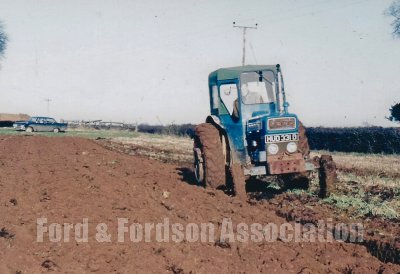
One of the pictures shows a 4000 with cage wheels working with a Vicon reciprocating power harrow, an early power harrow which was used to prepare good seedbeds for potatoes.
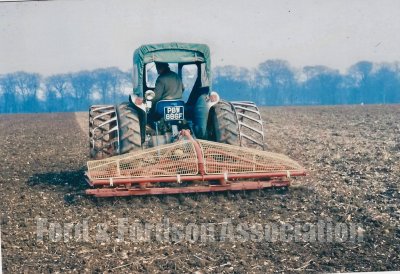
There is also a picture of some 6X tractors parked in an orchard.

They don't only produce scrumpy cider don't you know!

Well, that's all for now. So please keep well, stay safe, above all else use your common sense, KBO! Keep in touch:- This email address is being protected from spambots. You need JavaScript enabled to view it.
- Hits: 1253


